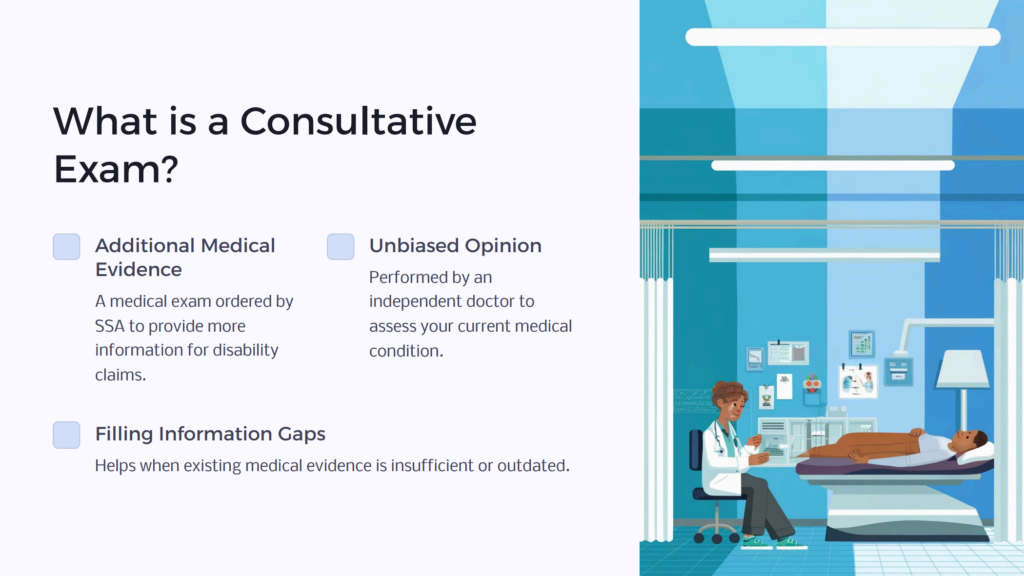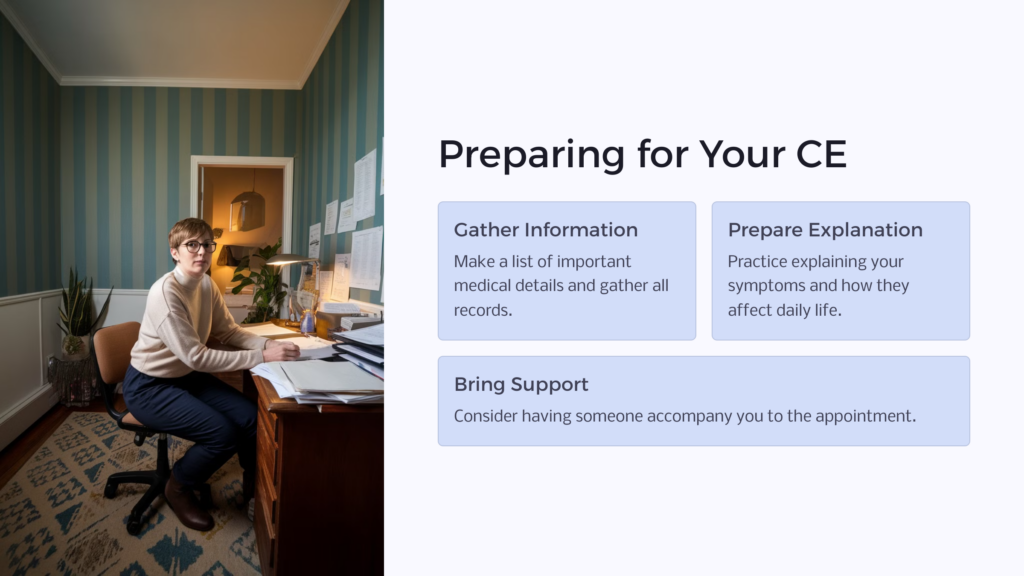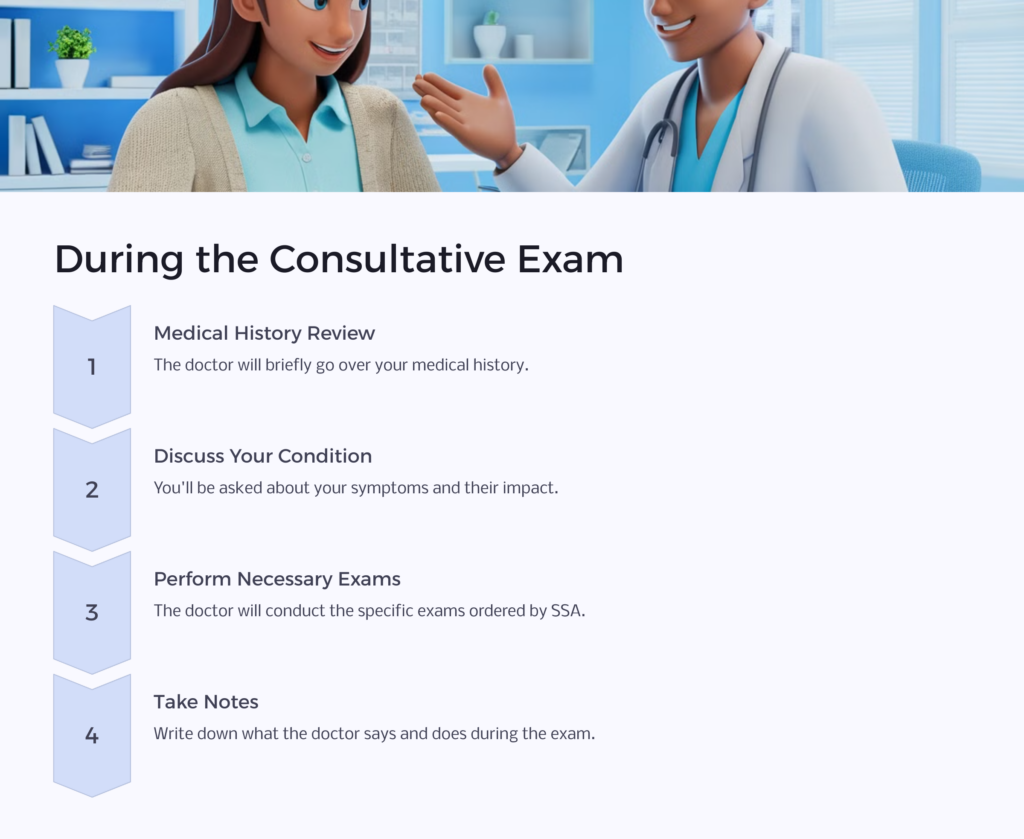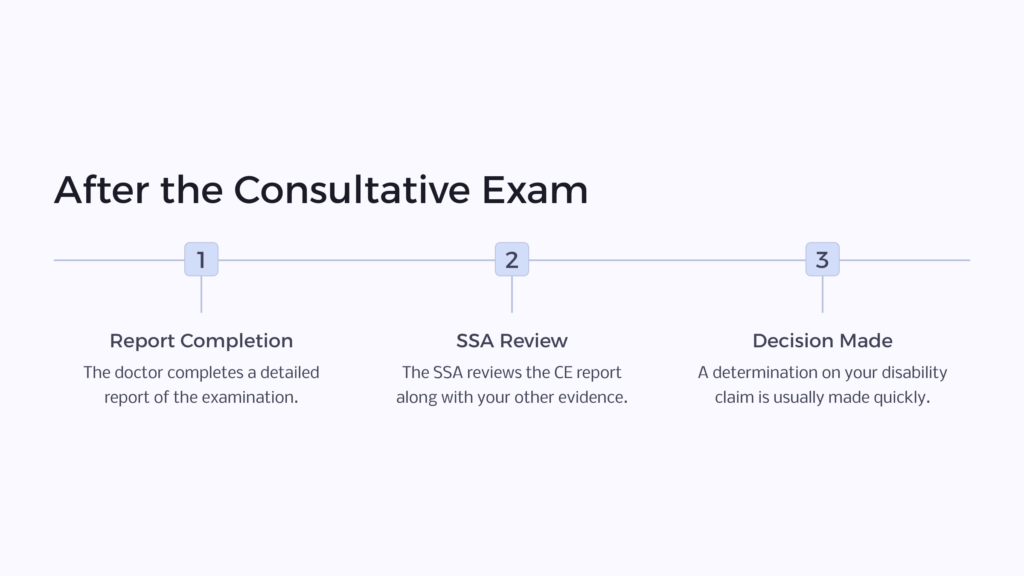The Social Security Administration (SSA) requires thorough, well-documented information from anyone who applies for disability benefits. Sometimes, a Social Security disability claim won’t include enough medical evidence about a claimant’s medical condition to warrant approval. When this happens, the SSA may require a consultative medical examination to provide an unbiased medical opinion for your case.
How to Plan for the Consultative Exam
- Check That You Actually Need a Consultative Exam
- Make a List of Important Information
- Gather Medical Records and Documents
- Prepare Your Verbal Explanation
- Make Sure the Doctor is the Right Fit
- Prepare to Have Someone Come with You
- Take Notes During the Exam
The SSA requires a consultative exam in a few situations, including when your doctor hasn’t provided enough information about your condition or hasn’t been cooperative in sending the required data to the SSA. Some doctors also aren’t qualified to complete the exams the SSA needs, so a specialist could be necessary to perform the exam.
The consultative exam (CE) can seem intimidating, but it could help you get the disability benefits to which you believe you’re entitled. It’s in your best interest to come to the CE prepared and cooperative to get the most out of your appointment.
Frequently Asked Questions About the Consultative Exam
When you apply for SSI or SSDI benefits, your application should include as much information about your medical condition and relevant symptoms as possible. If a disability applicant lacks this information, there’s a good chance they’ll need another medical examination to give the SSA ample information to approve or deny a case lawfully.
The following answers to these frequently asked questions should help you understand more about the consultative exam and what’s involved:
What is a consultative exam?

A consultative exam is any medical exam that the SSA orders for a disability applicant to provide more information and context for a disability claim. If your doctor hasn’t been cooperative in sending your medical information to the SSA or hasn’t sent enough medical evidence to determine SSDI eligibility, you will probably need a CE.
You can treat the consultative exam as you would any other medical examination. The doctor should briefly go over your medical history, ask about your condition, and perform the necessary exam(s) the SSA ordered. The consultative evaluation intends to assess your current situation and offer the SSA insight into how your condition could prevent you from doing everyday tasks.
Who performs the consultative exam?
The consulting doctor for your consultative exam can be your regular physician if they’re certified to perform the exam and willing to do so. If not, the SSA will order a consultative exam from an independent medical provider. This provider is one that you, the applicant, probably has not already visited, so you must come prepared with additional information about your condition and your complete medical record.
Also, remember that the Social Security doctor the SSA orders for the exam is not connected to the SSA in any way. Instead, it’s an independent physician who contracts with the SSA to perform the exam and offer unbiased information about your condition and results.
What if I don’t like the CE doctor?
It is possible that you won’t mesh with the doctor assigned to you. In some cases, you could have the doctor switched to a different doctor upon request. However, it’s unlikely that your disability claims examiner will approve the switch without a valid reason.
One valid reason the SSA might approve a CE doctor change is that you have reason to believe that the doctor is biased against you or your case. If the doctor has previously performed consultative exams for you that resulted in the denial of your disability claim, you could also be entitled to a switch.
Can I have my own doctor perform the CE?
In certain circumstances, your own doctor may be able to perform the CE. First, you should contact your disability examiner to learn more about the required exam, including its name and what it’s for. Then, you can ask your doctor if they have the credentials to perform the exam (this is known as an Acceptable Medical Source) and feel comfortable doing so.
If so, you should put in a request to your disability examiner in writing. Be sure to explain that you’ve already spoken to your doctor, who is credentialed and willing to perform the exam for you.
What if I am homebound and unable to travel to the doctor?
If you cannot leave your home to get to your CE appointment, you can request that the CE doctor come to your home per Social Security disability law. To request a home visit for CE purposes, you can contact your disability consultative examiner to learn what steps you need to take. In most cases, you’ll need a written request that explains the reason for the home visit.
What happens if I miss the doctor appointment?
Missing an appointment for a consultative exam can result in the denial of your disability benefits. If you believe you may miss your appointment, you should call to have it rescheduled as soon as possible. However, be aware that pushing back your appointment could stall the approval process, so it’s best to stick with your original appointment if you can.
What is in a consultative exam report?
The consultative exam report will be a detailed account of your medical history, test or lab results, and the physical examination. It will also contain some primary identifiers and physical characteristics of you to ensure that your medical documentation highlights the correct person. The consulting doctor will also include a write-up of whether you, under the guidance of the law, are disabled and whether you can work based on your symptoms.
What happens after a consultative exam?
After the CE, a determination of your disability claim usually goes relatively fast. At the time of the SSA scheduling your consultative exam, it has already reviewed most, if not all, of your medical information. The CE report is the missing piece of the puzzle to help the SSA make a final determination of your disability benefits.
You should expect to learn the results of your claim within a few weeks after your CE. You can check with your disability claims examiner within two to three weeks or ask your disability attorney to check for you.
How to Plan for the Consultative Exam

If the SSA has ordered a consultative exam for you, there are a few steps you can take to make sure the process goes as smoothly as possible.
Check That You Actually Need a Consultative Exam
First, double-check that you need the consultative exam. You may already have results from a test or exam that the SSA wants you to take to determine eligibility in some cases. It’s possible that the SSA sometimes overlooks this information or hasn’t finished reviewing your case in full before ordering the test again.
If you’re unsure if the information you have is sufficient to avoid a consultative exam, you can speak with a disability attorney for guidance.
Make a List of Important Information

Bring a list of anything that can help the treating doctor learn more about your case to give context for the exam. Remember, if the consulting doctor isn’t your regular physician, they won’t know your medical history. Listing your medications, recurring symptoms, the severity of symptoms, previous tests you’ve had done, diagnoses, and other relevant medical information provides the doctor with some background to lead to a more well-rounded exam.

Gather Medical Records and Documents
Although a list of exams and tests you’ve had done can be helpful to bring with you, you should attempt to bring whatever medical records you have along to your consultative exam appointment. Your medical records contain results of check-ups, blood and other lab tests, radiology exams, and other exams that could help a provider give a more accurate exam and insight into the claimant’s condition.
Prepare Your Verbal Explanation
Spend time crafting a verbal explanation of the symptoms you experience every day and their severity. Doing so can help you feel prepared to tell the doctor everything you can about your condition during the consultative exam. The medical provider will likely ask you some questions about your symptoms, and you’ll want to explain them as accurately as possible.
Be sure to explain how these symptoms interfere with your daily tasks, like bathing, driving, or eating, and how frequently you experience them.
Make Sure the Doctor is the Right Fit
You do have the right to object to a medical source if you don’t believe the provider is the right one for you. There are several situations in which the SSA will grant your request for a different provider, such as if you’ve previously had an exam with that physician, leading to a denial of your Social Security disability benefits. Prepare your objection in writing and keep a copy for your records. Send the original document to your disability examiner for consideration.
Prepare to Have Someone Come with You
There are two excellent reasons to have someone you trust come with you to your appointment:
- You could feel tired or stressed after your consultative exam. How you feel could depend on what testing the physician does during your physical consultative exam or mental consultative exam. Another person can drive you to and from your appointment, just in case.
- The person you bring with you can be a helpful witness for disability examinations. They can listen to what the physician says and watches what they do, and they may remember things you missed during the appointment.
Take Notes During the Exam
Whether you have a mental status examination or a physical examination, there will be a lot for you to remember during your consultative exam. Bring a notebook and pen to jot down notes as the physician works with you. Make a note of what you and the doctor talk about and what exams or procedures they performed.

Consultative Examination for Social Security Disability
The consultative examination can be anxiety-inducing for a claimant going through the Social Security disability process. Still, it’s a necessary tool for the SSA to deny or approve your claim. The CE provides detailed insight into how your condition affects your daily life, which is essential to relay to the SSA.
Treat it as you would any other medical appointment. Prepare your thoughts, ask questions, and bring along a trusted person to support you during the appointment. Your Social Security disability lawyer can assist you with preparing for your CE and answering any questions you may have about the process.
 Benefits.com Advisors
Benefits.com Advisors
With expertise spanning local, state, and federal benefit programs, our team is dedicated to guiding individuals towards the perfect program tailored to their unique circumstances.
Rise to the top with Peak Benefits!
Join our Peak Benefits Newsletter for the latest news, resources, and offers on all things government benefits.



















